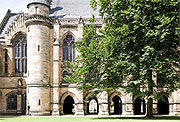Source: Glasgow Caledonian University: Gallacher Memorial Library
Notable People
James Maxton
-
James Maxton

-
James Maxton's matriculation record, 1904

Source: University of Glasgow
Socialist Politician
Born 22 June 1885, Pollockshaws, Scotland.
Died 23 July 1946.
A politician and leading member of the Red Clydeside movement.
Connection to the University of Glasgow: Graduate
GU Degree: MA, 1909;
Discover more politician on the University of Glasgow Story website
Achievements
The following achievement is associated with James Maxton:
Leading the Red Clydeside movement
One of the leading orators of his time, James Maxton was one of the prominent figures of the Independent Labour Party (ILP) in Glasgow and a key political figure during the Red Clydeside period.
Biography
James Maxton was a Glasgow graduate who became a socialist politician, a teacher and conscientious objector. He was prominent among Red Clydeside activists, a member of the Independent Labour Party and the elected MP for Bridgeton from 1922 to his death in 1946. He was a persuasive and powerful speaker, an intelligent and sincere radical voice inside and outside Parliament.
Maxton was born in 1885 in Pollockshaws. His father was a schoolteacher and a unionist. He was educated at Grahamston Public School, Barrhead and Hutcheson's Grammar School, to which he won a scholarship when he was twelve. He matriculated at the University of Glasgow in 1903. His education was lengthy, delayed a little by exam failures. He passed English in October 1909 on a tenth attempt and never did obtain a pass in Moral Philosophy. He graduated MA in 1909. He did, however, throw himself into life at university, taking an interest in sport and politics, where he began to question his inherited unionism and to explore socialist texts. He joined the Independent Labour Party (ILP).
He entered the teaching profession and like John Maclean, taught evening classes at Pollock Academy. The two men became friends, sharing a passion for radical politics, and later, opposition to the war. Both were imprisoned for a short time after addressing a crowd in Glasgow in 1915. Maxton also resisted conscription, an action that cost him his teaching post. Like Maclean his speeches also fell foul of the law. He was tried for sedition in May 1916 and sentenced to a year in Calton jail. After the war he stood for Parliament, at first unsuccessfully. Records show that he returned to university between 1920 and 1922 to take classes in Political Economy, Forensic Medicine and Public International Law, perhaps with the intention of completing a law degree. In 1922, however, he won Bridgeton for Labour and went to Westminster. He became disillusioned with the party for its lack of support for the miners and in 1931, when the ILP and Labour split he sided with the ILP. He died on 23 July 1946.

